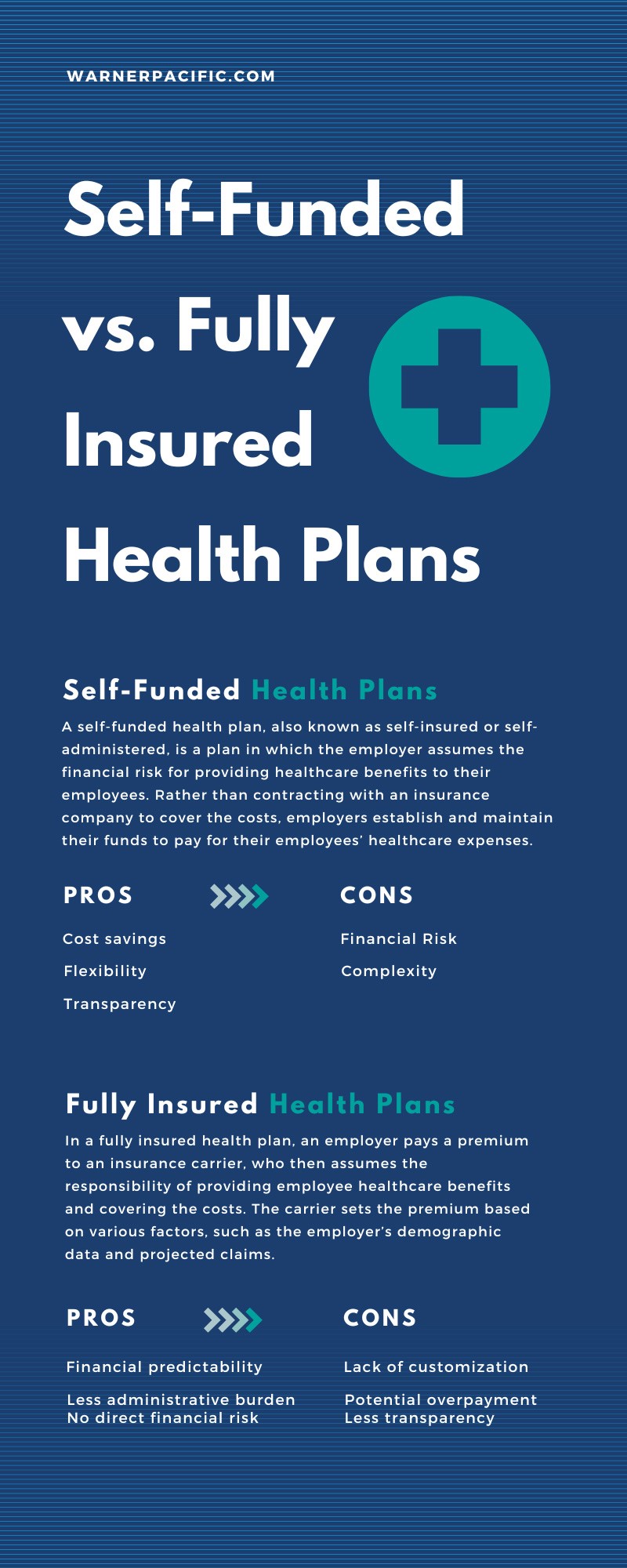8/4/2023
California
Colorado
Florida
Oklahoma
Texas
Self-Funded Health Plans
A self-funded health plan, also known as self-insured or self-administered, is a plan in which the employer assumes the financial risk for providing healthcare benefits to their employees. Rather than contracting with an insurance company to cover the costs, employers establish and maintain their funds to pay for their employees’ healthcare expenses.
How They Work
In self-funded health plans, employers usually purchase stop-loss insurance to provide a financial safety net in the event of high claim costs. This insurance policy covers claims exceeding a predetermined threshold, which helps manage the employer’s financial exposure. The employer also contracts with a third-party administrator (TPA) or insurance carrier to handle claims processing, provider networks, and other administrative tasks.
Fully Insured Health Plans
In a fully insured health plan, an employer pays a premium to an insurance carrier, who then assumes the responsibility of providing employee healthcare benefits and covering the costs. The carrier sets the premium based on various factors, such as the employer’s demographic data and projected claims.
How They Work
The insurance carrier collects premiums from the employer and pools the funds with those of other companies in their risk pool. The carrier uses these funds to pay for the insurance-eligible healthcare costs for all employees in that risk pool. Employers typically have less direct involvement in the administration of fully insured health plans.
The Pros and Cons
When deciding between self-funded and fully insured health plans, it’s important to consider the advantages and disadvantages of each.
Self-Funded Health Plan Pros
- Cost savings: Employers have the potential to save on healthcare costs since they only pay for actual healthcare expenses incurred, rather than a predetermined premium based on projected costs.
- Flexibility: Self-funding allows employers to tailor their health plan offerings to their employee population, rather than being limited by insurance carriers’ offerings.
- Transparency: Employers have access to detailed claims data, providing insights into their employees’ healthcare needs and allowing for targeted efforts to improve employee health and wellness.
Self-Funded Health Plan Cons
- Financial risk: Employers assume the financial risk for providing healthcare benefits, which can be unpredictable and may lead to significant expenses in high-cost claim years.
- Complexity: Establishing and maintaining a self-funded health plan often requires additional administrative work, such as contracting with TPAs, managing stop-loss insurance policies, and navigating compliance requirements.
Fully Insured Health Plan Pros
- Financial predictability: Employers know their healthcare costs upfront in the form of premiums, allowing for easier budgeting and cost management.
- Less administrative burden: Insurance carriers handle most administrative tasks, such as claims processing, relieving the employer of much of the paperwork and red tape associated with managing a health plan.
- No direct financial risk: The insurance carrier assumes the financial risk for healthcare costs, which can be particularly appealing for smaller businesses or those not equipped to handle potential high-cost claim years.
Fully Insured Health Plan Cons
- Lack of customization: The employer must choose from the plans offered by the carrier, which may not fully align with employee needs.
- Potential overpayment: Since premiums come from projected claims, there is a possibility that employers might end up paying more than the actual healthcare costs incurred by their employees.
- Less transparency: With fully insured plans, employers generally have limited access to claims data, which can make it difficult to identify trends and make data-driven decisions about health benefits.
Selecting the Right Plan for Your Client
Now that we’ve covered the basics of self-funded vs. fully insured health plans, it’s important to understand how to decide which option is the best fit for your client. Being able to assess each business’s unique needs can help set you apart in the brokering profession. Keep the following considerations in mind as you advise your clients.
Risk Tolerance
Some businesses are much more comfortable taking on a financial risk than others. After all, budgeting can look completely different depending on company size, scale, and industry. If your client is comfortable taking on financial risk and believes that their employees’ healthcare costs will be lower than the premiums, a self-funded plan could be a good fit.
Company Size
The overall size of your client’s company can also affect the decision they ultimately make for their team. As a general rule, larger companies with more employees may be better suited for self-funding, as they are able to widely distribute the risk. Alternatively, smaller companies may prefer the financial predictability and administrative ease of fully insured plans. Once again, this will vary from client to client, so it’s best to always assess each business’s needs before making recommendations.
Administrative Capability
Remember to take into account how much administrative management certain plans will need when making recommendations. If your client has the resources and expertise to manage a health plan, they might benefit from the flexibility and transparency of self-funding. On the other hand, fully insured plans could be a better choice for companies that prefer to outsource most of the administrative tasks.
Employee Needs
Consider the demographics and healthcare needs of your client’s employee population as well. You can customize a self-funded plan to better meet these needs, while a fully insured plan might be easier and quicker to implement.Both self-funded and fully insured health plans have their advantages and disadvantages, meaning the best choice depends on your client’s unique circumstances and needs. Your role is crucial in helping your clients navigate these options and make informed decisions that align with their business goals and employee needs. If you find yourself in need of assistance as you work with your clients, Warner Pacific can help. We offer resources to guide you through many situations related to the insurance industry, and we specialize in several types of coverage, including self-funded, fully insured, and level funded medical plan services. Contact us today to learn more.


